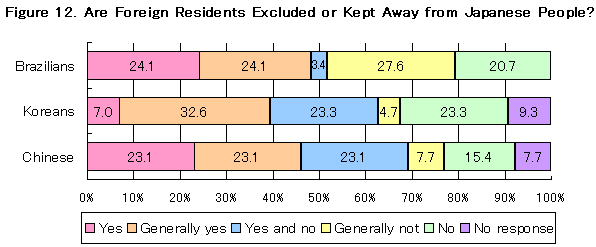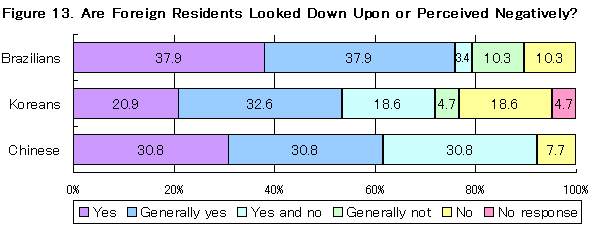4th Quarterly, 2005 No.138
2004 Nabari City Survey Concerning Human Rights <Part III>
The Public Perception of Foreign Residents
Foreign residents in the regions of Nabari City, Mie Prefecture and Japan
Since the mid-1980s an influx of "newcomers" has led to a dramatic increase in the number of foreign residents in Japan. In 1985 there were 9,199 foreign residents living in Mie Prefecture and 144 in Nabari City, but these numbers increased nearly 5-fold to 43,621 and 657 respectively by 2004. As of 2003, Mie Prefecture ranks as Japan's eighth-most multicultural prefecture in terms of proportion of foreign residents, who make up around 2.1% of the prefecture's population. While Nabari City has followed a similar trend to Mie Prefecture with an increase in number of foreign residents, they still only represent a relatively small proportion (0.7%) of the city's population. However, with the increase in number of Brazilian and Chinese residents in particular, this upward trend is expected to continue.
Nabari City Foreign Resident Nationalities
As of February 2004, the largest group of foreign residents in Nabari City by nationality were the city's 239 Brazilians, who accounted for 38% of all foreign residents. They were followed by 210 Koreans (34%), 94 Chinese (15%), 25 Americans (4%), and 16 Filipinos (3%). In all, there were 21 different nationalities represented.
Length of Residence
The vast majority of Korean respondents to the questionnaire were born and raised in Japan. They are believed to have either migrated to Japan during the Japanese colonization of the Korean Peninsula, or are descendants of those migrants.
Brazilian respondents have lived in Japan for an average of 13.7 years, and in Nabari City for 11.4 years. Most remain in Japan with the intention to return to Brazil in the not-too-distant future. However, other surveys conducted in areas with a high population density of Japanese-Brazilians demonstrated ongoing settlement regardless of intentions to return to Brazil. It is reasonable to assume that this trend will also occur in Nabari City. The average length of stay among Chinese respondents in Japan was 10.7 years and 6.2 years in Nabari City.
Brazilian and Chinese residents in both Nabari City and Japan tend to be long-term residents. It is expected that they may continue to stay and eventually settle in Japan.
Discrimination and Prejudice against Foreigners
What is the ideal relationship between foreign residents and Japanese and how can we achieve it? To begin with, we will examine the following two questions from the perspective of discrimination and prejudice: (1) What is the nature of current relationships between foreign residents and Japanese? and (2) What kind of relationships do they want (multicultural, assimilation, unification or separation)?

Foreign Residents' Perceptions of Discrimination and Prejudice
Figure 12 shows responses to the question of whether foreign residents in Japan, not limited to the respondents themselves, are sometimes excluded or kept away from Japanese people. In each nationality group, between 40 to 50% of respondents answered "yes" or "generally yes."
Figure 13 shows responses to the question of whether foreign residents in Japan, again not limited to the respondents themselves, are looked down on or perceived negatively. Answers of "yes" or "generally yes" were given by more than 70% of Brazilian, 50% of Korean and 60% of Chinese respondents.

Experiences of Discrimination
The above answers reflect the reality of foreign residents' lives in Japan. The following cases have been taken from a section within the survey that gave respondents an opportunity to provide additional information.
- When my aunt was leaving a shop, a female shop clerk stopped her to check her bag. The clerk suspected she had stolen something. We are here in Japan not to steal, but to save money. (Brazilian in his 20's)
- I had trouble with my next-door neighbours. The other day I was playing music and talking with my friends in the parking lot. An hour later, some police came to tell us that we were disturbing our neighbours. I do not think that was right. If they had a problem, shouldn't they have told us directly? It was not necessary to call police. (Brazilians in his 20's)
- It is pity that discrimination based on nationality still exists, despite the fact that it affects people who may have lived in Japan since birth. Once, during a job interview, the interviewer gained a favourable impression of me and expressed a desire to employ me. However, a few days later, after I sent a copy of my residence certificate, they changed their attitude and phoned to inform me of the cancellation of my employment. The reason for the cancellation was not clear, but it still leaves a bad taste in my mouth. (Korean in her 50's)
- During conversations, I sometimes hear people make discriminatory remarks against Korean residents. They do not seem to be aware that I am Korean. (Korean in his 50's)
-
Background of Discrimination and Prejudice
Are the shop clerks or next-door neighbours in the above stories limited to Nabari? This is probably not the case. Nearly 60% of Nabari citizens and more than 40% of Nabari City employees support the opinion that an increase in number of foreign workers causes deterioration of security and moral order. This is inextricably linked to the fact that many foreign residents feel marginalized by Japanese society.
(to be continued)
* Buraku Liberation and Human Rights Research Institute is responsible to translation.
